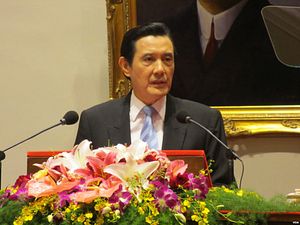When The Economist recently reported that Taiwan’s trade with China “ballooned” during the administration of outgoing President Ma Ying-jeou of the pro-China Kuomintang (KMT), it was repeating what has become a commonplace among writers on the cross-strait relationship. We are told that trade “boomed” under Ma (Washington Post, Institutional Investor), or “particularly since Ma” (East Asia Forum, International Business Times), or that since Ma cross-strait trade has “climbed more than 50 percent” (New York Times) and even “soared” (Economist). Indeed it is possible to write that China is “showering” Taiwan with economic benefits (East Asian Forum), that booming cross-strait trade was “only a hope little more than a decade ago” (National Interest), and that Ma’s policies have resulted in “substantial material gain” (National Interest).
There is just one problem with these thoroughly conventional claims: they are thoroughly wrong. Anyone can learn this by grabbing the data from Taiwan’s Bureau of Trade (search by value; select China). Since Ma took office in 2008, the rate of growth in Taiwan’s trade with China has shriveled and net trade gains have been anemic. Things have been especially bad since the signing of the Economic Cooperation Framework Agreement (ECFA), invariably lauded as a “landmark trade agreement” in the international media. Most importantly, the robust trade surplus Taiwan enjoyed with China has declined every year, a fact completely unreported in the international media.
In 2000, when Ma’s predecessor from the pro-Taiwan Democratic Progressive Party (DPP) Chen Shui-bian took office, trade between Taiwan and China (minus Macao, which is negligible, and Hong Kong, usually stable around $40 billion) was $10.4 billion. It skyrocketed to $98.2 billion in 2008, for a gain of nearly $88 billion. In 2008 Ma came into office. Trade has since peaked at $130.1 billion in 2014, falling back to $115.3 billion in 2015. The net gain from trade in the eight years of Ma Ying-jeou? A piddling $17.2 billion.
To put that number in perspective, any two-year period in the Chen administration saw greater gains. For example, from 2002 to 2004, trade jumped roughly $35 billion, and between 2006 and 2008, it rose another $22 billion. Moreover, unlike the Ma administration, the Chen administration never experienced negative trade growth with China.
In 2010 Ma Ying-jeou’s government signed the ECFA with China, an agreement promoted and now touted by journalists who largely live outside Taiwan. Almost immediately trade with China began to stagnate. After slumping in 2009, two-way trade recovered to $112 billion in 2010, and then hit $127 billion in 2011. After ECFA? It hovered in the $120 billion range, finally clambering to $130 billion in 2014 before plummeting to $115 billion last year. At present, thanks to China’s slowing economy, trade is now lower than before the “landmark” ECFA agreement came into effect.
More ominous than the trade numbers is the relentless slide in Taiwan’s trade surplus with China. The trade surplus rose all but two years under the Chen Administration, including an unbroken string of increases between 2003 and 2008. The Ma administration stood this progress on its head: the trade surplus has fallen all but two years under the Ma administration, and has shown an unbroken string of declines since ECFA came into force in 2011. By 2015 it had crashed from $40 billion to $27 billion, effectively returning to its 2006 levels. No major media outlet has reported this telling fact.
The international media tells one story; the numbers tell another. What China is “showering” Taiwan with is not economic benefits, but exports. Looking at the numbers, it is difficult to avoid the conclusion that the real intention of ECFA was to flood Taiwan with Chinese goods and reduce the trade surplus, just as Ma’s critics had predicted.
Nor are the tourism policies any different. AP reported in 2011 that the government spending figures for Chinese tourists, collected by survey of Chinese tourists, are inflated. But even using the inflated government figures, a 2014 paper in the Journal of Travel Research shows that tourism is a net loser for Taiwan.
The failure of journalists to honestly and robustly report on Ma’s China policies has resulted in a failure cascade across all Taiwan reporting. Because journalists will not explain the rejection of Ma’s trade pacts and the collapse of support for the KMT forthrightly in terms of the stunning failure of Ma’s China policies, they have to fall back on a variegated collection of journalistic tropes: “the rising Taiwan identity,” or the failure of Ma’s policies to improve wages and income inequality, or attempt to frame objections to Ma’s glorious but fictional successes as mere disgruntled political opposition from “hardline” independence supporters or some form of “anti-China” (in reality, pro-Taiwan) sentiment. All these factors certainly played a role, but there is no question that had Ma’s China policies had the success in real life that they enjoyed in the international media, the follow-on services pact would not have been the target of an occupation of the legislature and would have enjoyed massive public support. And the KMT would have done much better in the recent elections.
The ECFA echo chamber is just one aspect of a pervasive problem with the international media reporting on Taiwan: it is governed by tropes and conventions that not only obscure and mislead, but are often highly pro-Beijing. With a new pro-Taiwan president and party in power in Taipei, Taiwan’s China policies are likely to change. Given what has gone before, readers may rest assured that this will trigger a new round of complaints in the international media: the new government is destroying the massive China trade successes of the Ma administration.
Michael A. Turton blogs on Taiwan politics and culture at The View from Taiwan

































